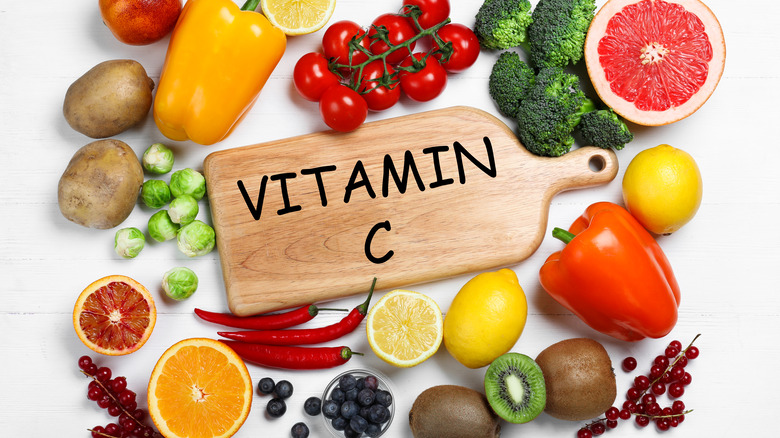Side Effects Of Taking Vitamin C You Never Expected
Whenever you think about vitamin C, you may visualize eating a satisfying citrus fruit, gulping down a glass of sweet orange juice, or popping a vitamin C supplement. You may have never considered, though, that intaking too much vitamin C can potentially have some negative side effects.
First, why is vitamin C important? Vitamin C helps with a number of important functions, including promoting blood health and muscle strength, while also playing a key role in the body's natural healing process. If you are deficient in vitamin C, you could be at increased risk for anemia or bruising (via Mayo Clinic). However, your body doesn't produce vitamin C naturally, so you need to get it through foods or supplements.
While vitamin C is safe for almost everyone, adding vitamin C supplements to your diet can potentially cause negative side effects such as nausea, vomiting, and stomach cramps (via WebMD). And, as you might expect, the chances of these side effects occurring increases with the more vitamin C you consume.
What are other potential side effects of taking vitamin C?
According to the National Institutes of Health, vitamin C can also cause problems if taken with certain medications or other supplements. For example, vitamin C could interfere with the efficacy of chemotherapy or radiation for people undergoing cancer treatments. Additionally, a study revealed that vitamin C, when taken with an antioxidant like vitamin E, seemed to negatively interfere with a combination of drugs meant to control blood cholesterol levels.
Another possible outcome of overdoing your vitamin C supplementation is developing kidney stones. You typically eliminate excess vitamin C from your body through your urine as a waste product called oxalate. But with too much vitamin C, oxalate levels can increase and crystallize in your urine resulting in kidney stones (via Eco Watch).
Chances are you are already getting enough vitamin C through your diet. However, if you are concerned about maintaining your vitamin C levels, Medical News Today recommends that you increase your vitamin C levels naturally by eating more fruits and vegetables. But if you decide that you would rather take a vitamin C supplement instead, it would probably be best to first consult your doctor.


